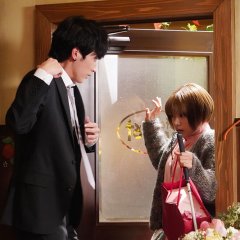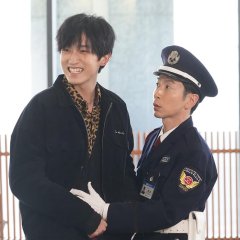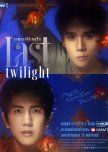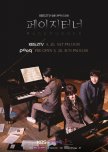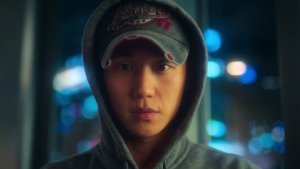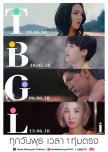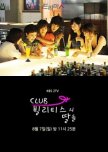 The Kawaii Factor in J-Dramas: Female Leads
The Kawaii Factor in J-Dramas: Female Leads - Italiano
- Русский
- Türkçe
- Polski
- Titolo Originale: 恋です!~ヤンキー君と白杖ガール~
- Conosciuto Anche Come: I'm in Love!: Yankee-kun and the White Cane Girl
- Sceneggiatore: Matsuda Yuko
- Regista: Kariyama Shunsuke, Uchida Hidemi
- Generi: Commedia, Romantico, Vita
Cast & Ringraziamenti
- Sugisaki Hana Ruolo Principale
- Sugino Yosuke Ruolo Principale
- Suzuki NobuyukiKanazawa ShishioRuolo di Supporto
- NaoAkaza IzumiRuolo di Supporto
- Kishitani GoroAkaza SeijiRuolo di Supporto
- Tanabe MomokoShimura SoraRuolo di Supporto
Recensioni

A true joy to watch - with a HEALTHY & WHOLESOME relationship! :D
If you think that this is some tearjerking, serious, or sentimental drama just because it deals with disabilities (the poster image on here really makes it look that way), I assure you, it’s the complete opposite. Full of fluffy, goodhearted romance and comedy, and most importantly, one of the rare dramas that has a healthy relationship with open communication and realistic problems between two socially belittled individuals, Koi Desu may just be one of my favourite J-Dramas of this year. FINALLY Sugino has a breakthrough character that perfectly fits him, and the acting between both FL and ML is effortless and it just makes you feel all warm and fluffy while watching them!Sugino Yosuke has really been meh in other shoujo/josei dramas I’ve seen him in, either being too cringy as an “ikemen” character or not memorable enough. I really think that this is a huge turning point for him, as he plays the character of Kurokawa Morio so effortlessly. Morio is goofy, earnest, and wears his heart on his sleeve, not taking offense and trying to learn and understand Yukiko’s eye condition, which creates an unbelievable gap moe to his threatening “yankee” demeanor (he just looks cute imo). He’s patient with the FL and understanding of the protectiveness of her family, never pressuring the FL to reciprocate his feelings for her.
Sugisaki Hana has also been very “meh” for me, but her character as Yukiko is headstrong, kind, and independent in this drama. Her acting and skepticism towards Morio is realistic and understandable. She is someone who is constantly wanting to prove that she can do things just as well as others can. And the two really do have an affinity with each other!
The other characters are all really delightful to watch, and the drama is kept to a minimum that gets resolved by the end of the episode. It’s an inspiring, uplifting drama that will leave you feeling giddy and envious of the leads’ onscreen relationship. I highly recommend it! :)
Also, the little informative comedy asides by the comedian Hamada Yutaro, who is also blind in real life, are really entertaining! I love that they included him and gave him a platform to speak and further explain the tools, resources and feelings that blind individuals encounter on a daily basis, all in a light-hearted fashion. You definitely don't want to miss this one!
Questa recensione ti è stata utile?

Marshmallow-Chocoholic
22 persone hanno trovato utile questa recensione
Love Is Not Always Blind…
‘Koi Desu: Yankee-kun to Hakujou Garu’ ( alternatively translated as ‘ It’s Love; Yankee-Kun and The White-Cane Girl’) is based upon the manga ‘ Yankee-Kun and The White Cane Girl’. Adapted to the small screen by screenwriter Matsuda Yuko, ‘ Koi Desu: Yankee-kun to Hakujou Garu’ revolved around the sweet and unusual love story between Akaza Yukiko ( Sugisaki Hana) , a girl diagnosed with amblyopia ( a condition where the individual suffers from impaired or degraded vision) who uses a white stick, and a kindhearted delinquent Kurokawa Morio ( Sugino Yosuke). Despite initially being put off by his persistent attitude and self- proclaimed “ feelings ” for the female lead, Yukiko finds herself gradually warming up to the eccentric delinquent despite many obstacles that face them.Whilst sometimes a quick aside from comedian Hamada Yutaro ( playing himself) or a voiceover by Yukiko could feel a little arbitrary at times , it was evident to see that throughout more predictable romantic setups, the drama desperately pushed forward positive and didactic messages in order to disperse social stereotypes and stigmas surrounding blind and visually impaired individuals.
However whilst praise and commendation must be given to ‘Koi Desu: Yankee-kun to Hakujou Garu’’s themes and depictions, the acting could admittedly was a mixed-bag . Of course this isn’t to bring down any of the respected actors as individuals. Sugisaki Hana’s onscreen performance as Yukiko captured the mannerisms of her character’s amblyopia subtly, whilst Sugino Yosuke added a heart-melting charm to Morio onscreen. Nevertheless it is notable that certain line deliverances by the cast could sometimes feel exaggerated.
As a character , Akaza Yukiko undeniably has her screenwriting strengths and weaknesses. She’s not defined as a main female lead by being “ frail” or “ timid” female lead trope due to her visual disability, and instead, was often shown to have a more stubborn side when problems arise due to a hurtful experience in the past. Whilst this incident admittedly did play a major role through brief foreshadowing in early episodes, the “tense” buildup could often feel anticlimactic . Foreshadowing towards Yukiko’s past could’ve easily been brought up early on to deliver greater impact in later episodes. In particular this subject could’ve easily been conveyed more frequently through conservations and interactions with her older sister Izumi ( Nao) as well as her father Seiji ( Kishitani Goro).
However this also brings up the elephant in the room in the series also; Yukiko’s family dynamic. Understandably it is not uncommon for different beliefs and viewpoints to be taken by family members towards a visually impaired relative. In the series this was often reflected by the differences between Yukiko’s sister being overprotective towards Yukiko whereas her father Seiji could often adopted a laissez-faire and easygoing attitude. It felt odd that aside from Izumi being the first to disapprove of Kurosawa being “ unworthy” for Yukiko, there was little reaction or insight into Yukiko’s own feelings towards her sister acting this way. Additionally there was rarely little conflict presented between Yukiko and Seiji’s different viewpoints in order to present greater insight for viewers into this differing family bond also.
Naturally this brings us onto main male lead Kurosawa Morio. Morio embodied the stereotypical stock trope of the “ delinquent with a heart of gold”.His physical appearance ( and especially his scar) have given him a bad reputation over the years. However despite first appearances, Morio is revealed to be a naturally kindhearted soul. Throughout the series Morio tried his best to accommodate to Yukiko by asking and learning more about her everyday life. Yet whilst Morio is undeniably a male lead with a big heart , there were certainly moments regarding his character arc which could often feel disjointed. Of course it was not necessarily quintessential that we had to know everything about Morio’s background or past. Nevertheless there was still a lot of potential to have delved deeper into his reasons for being perceived as a “ failure” and dropping out of school, greater social stigma surrounding his “ delinquent” appearance ( aside from a few key scenes when it was necessary to the plot) , the reasons behind his current adopted mindset as well as his home environment also.
Of course this brings us onto the main topic of discussion; the romantic relationship between our main leads. Sugino Yosuke and Sugisaki Hana had fairly dynamic onscreen chemistry together adding to a charismatic and friendly interactions onscreen. As characters it shouldn’t come as a surprise that there were many obstacles presented throughout the storyline to “ complicate” matters between Akaza Yukiko and Kurosawa Morio’s potential relationship. Naturally whilst a lot of these opportunities saw opportunities to facilitate heartfelt and angst-ridden scenes in order to explore relationships, feelings and strengthen relationships chemistry, there were some still some predictable tropes which lacked the element of surprise also .
Overall ‘Koi Desu: Yankee-kun to Hakujou Garu’ is a fairly sweet and laidback love story. The acting front is decent enough ( sans from a few awkward scenes and lines) and the main leads have enough chemistry to keep viewers entertained. Admittedly the characters could often feel archetypical at times but the series enjoyed diverging from expectations and allowing characters to grow from their experiences. Perhaps whilst a few areas and topics which could’ve been brushed up more, ‘Koi Desu: Yankee-kun to Hakujou Garu’ will likely be a fairly heartwarming watch for any romance fan.
Questa recensione ti è stata utile?











